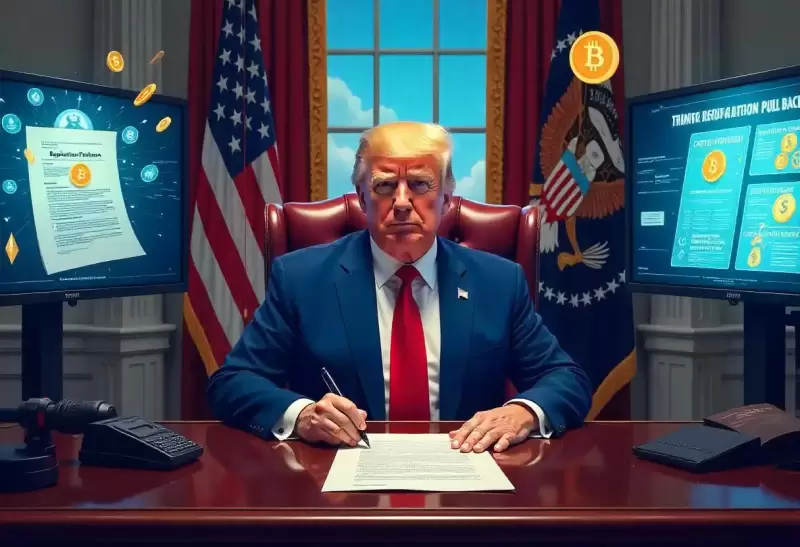 |
|
 |
|
 |
|
 |
|
 |
|
 |
|
 |
|
 |
|
 |
|
 |
|
 |
|
 |
|
 |
|
 |
|
 |
|
Cryptocurrency News Articles
Trump Signs Bill to Block IRS DeFi Tax Regulation
Apr 12, 2025 at 01:53 am
The IRS devised a rule that intended to redefine what constitutes a broker by encompassing decentralized crypto exchanges into the definition.

President Donald Trump has signed a bill that cancels a controversial IRS rule affecting the cryptocurrency industry and which supporters say is a major win for users of decentralized finance platforms.
The IRS had devised a rule that redefined what constitutes a broker to include decentralized crypto exchanges. These platforms, which people can use to conduct direct transactions with other customers via the blockchain without traditional intermediaries, would need to submit user tax data, including digital asset sales amounts, to the Internal Revenue Service.
The rule, which was set to take effect in 2026, drew criticism even before its implementation. The cryptocurrency industry heavily criticized this DeFi-related rule because they viewed it as overly broad and practically impossible to execute. Due to their nature, DeFi systems do not have the capabilities to collect personal data from users and maintain access to funds, rendering them unable to comply with reporting obligations.
The IRS finalized the updated rule just as the Biden administration was set to end in December 2024. The new tax guidelines brought DeFi platforms within their scope of legislation. The public announcement of taxes on DeFi systems quickly drew opposition from cryptocurrency developers, together with investors and privacy advocates, because they expressed concerns about both technological advancement and personal freedom.
Members of Congress stepped in because of these developments. The House of Representatives and Senate passed a Congressional Review Act-approved bill to repeal the IRS rule in March 2025. Congress has the power through the Congressional Review Act to abolish recently implemented federal rules by passing legislation with minimal parliamentary approval. After House and Senate lawmakers approved the repeal of the bill, it was forwarded to President Trump for his signature.
New Law Bans IRS from Targeting DeFi Without Congress
On April 11, 2025, President Trump formally signed the passed bill into law. Through his signature, President Trump blocked the updated broker rule by the IRS and permanently exempted it from reinstatement without Congressional approval of a new rule.
Supporters of the decision hailed it as a victory for liberty, innovation, and privacy. Representative Mike Carey argued in favor of the bill because the proposed requirement would generate an excessive amount of paperwork, which could overwhelm the IRS during tax filing time.
His prediction suggested the regulation would undermine America’s position as a leader in blockchain technology and crypto research. Furthermore, Carey stated that the IRS should concentrate on its existing responsibilities rather than creating new, burdensome rules. The Congressman also thanked President Trump for his defense of the industry, together with praising Crypto Czar Sacks for his groundwork on this legislation.
The Infrastructure Investment and Jobs Act from 2021 was the source of this rule’s origin. The legislation ordered IRS personnel, together with members of the Treasury Department, to create protocols for digital asset disclosure. IRS exceeded its authorized scope of duty, according to critics who assessed their work.
Specifically, administrators added self-custodial wallets and noncustodial software developers who do not directly manage user data to their regulatory scope under the updated rule.
With his signature, President Trump expressed support for digital assets and set a positive precedent in the digital asset industry. This new legislation forbids any future administration from reinstating comparable IRS reporting rules without completing full legislative procedures.
Ultimately, this decision shifts US government policy toward cryptocurrency regulation into a new direction. The new legislation safeguards innovation and decentralized infrastructure while defending user information privacy.
Disclaimer:info@kdj.com
The information provided is not trading advice. kdj.com does not assume any responsibility for any investments made based on the information provided in this article. Cryptocurrencies are highly volatile and it is highly recommended that you invest with caution after thorough research!
If you believe that the content used on this website infringes your copyright, please contact us immediately (info@kdj.com) and we will delete it promptly.





























































